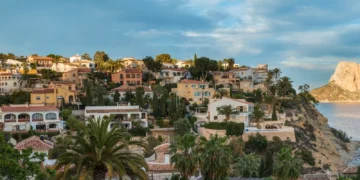Along Spain’s sun-kissed Costa Blanca, in the charming seaside town of Calpe, stands a colossal limestone sentinel—Penyal d’Ifac. Towering 332 meters (1,089 feet) above the sea, this rugged rock formation juts nearly a kilometer into the Mediterranean, its sheer cliffs standing as a timeless monument to history, nature, and human endeavor. Today, it is a symbol of Calpe, a protected natural park, and a magnet for adventurers.
But what if we told you that this striking landform was once an island?
A Geological Transformation
Long before the modern coastline took shape, Ifach stood alone, separated from the Iberian mainland by a narrow strait. Over the millennia, shifting sands carried by ocean currents gradually built a natural bridge connecting the rock to the shore. The wind sculpted dunes, sealing off the space between the cliffs, and thus, a lagoon was born. This body of water, today known as Las Salinas, is a unique saltwater lake where fresh and seawater intertwine, creating an ecosystem teeming with birdlife—including the famous pink flamingos that have made it their home.
This dramatic transformation changed the fate of Ifach forever, turning what was once an isolated islet into a strategic stronghold that would witness the rise and fall of civilizations.

Echoes of the Ancient World
The first known inhabitants of Ifach were Iberian tribes, who used its steep cliffs as a natural defense against invaders. With its commanding view of the coastline, the rock became a perfect vantage point for watching over trade routes and fending off potential threats.
Then came the Phoenicians, the great maritime traders of the Mediterranean, who likely used the area as a key waypoint in their commercial networks. However, it was the Romans who truly left their mark. Recognizing Ifach’s strategic importance, they established a colony here, naming it “Ifach”—meaning “North” in their language. The rock served as a fortified outpost, guarding their trade routes and ensuring control over the surrounding territories.
Archaeological excavations at the foot of the rock have uncovered remnants of ancient walls, Roman roads, and pottery fragments, hinting at a once-thriving settlement. Some historians even believe that Ifach played a role in the lucrative garum trade, a fermented fish sauce highly prized across the Roman Empire.
A Natural Wonderland
While history whispers from its ancient stones, Ifach today is better known for its awe-inspiring natural beauty. In 1987, it was declared a natural park, protecting the diverse flora and fauna that thrive in its rugged landscape. Over 300 species of plants can be found here, including endemic varieties that exist nowhere else on Earth. Birds of prey circle the towering cliffs, while climbers and hikers test their endurance against its formidable slopes.
The ascent to the summit is no easy feat. The hiking trail, a mix of rocky paths and carved stairways, takes adventurers through a tunnel hewn through the heart of the mountain—a passage originally carved in the early 20th century. Beyond the tunnel, the path narrows, winding ever higher to a dramatic panoramic viewpoint. From here, on a clear day, you can see as far as Ibiza, the Balearic island lying nearly 100 kilometers (62 miles) away.

The Coastal Jewel of Calpe
At the foot of Ifach lies Calpe, a town that seamlessly blends history with modernity. Once a humble fishing village, it has grown into one of the most sought-after coastal destinations in Spain. Yet, despite its popularity, Calpe has retained its authentic charm.
Its picturesque beaches—Arenal-Bol and La Fossa—offer golden sands and crystalline waters, perfect for those seeking relaxation after a day of adventure. Nearby, in the bustling Calpe Port, fishing boats unload their daily catch, and visitors can indulge in some of the region’s most exquisite seafood. The local specialty? “Arroz a banda,” a rich rice dish cooked in fish broth, a true delicacy of the Costa Blanca.
A Timeless Icon
From its origins as a lonely island to its transformation into a natural fortress, Ifach has stood witness to the march of time—an enduring symbol of strength, beauty, and mystery. Whether you come to hike its rugged trails, explore its ancient past, or simply admire its breathtaking silhouette against the Mediterranean sky, one thing is certain: Ifach will leave you spellbound.






















